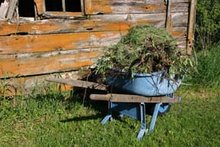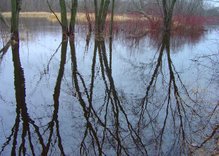Today I am no longer an expectant grandfather. Tate Bradley Robertson was born into this world yesterday in faraway Reno, Nevada. I can't even imagine what the weather was like yesterday in Reno on Tate's birth day, but In north-central Minnesota yesterday was beautiful, sending much needed rain to what had been a cool and dry month. Last night, with the wind coming up, choirs of frogs insisted that spring was arrived. The frost is mostly out of the ground by now, and the lilac buds have greened and are just about ready to open. The talk of the rain here at the farm was a good respite from a week's talk of tragedy in Virginia and foolishness in Washington.
My wife, Sally, found this nice piece by Thomas Merton about the rain speaking with so much more eloquence than the voices of politics and commerce we hear all around us. I like to think that the way Merton hears the rain in his cabin is kin to how we are able to hear it at the farm too. And that, even though separated by half a continent, we'll be able to help Tate experience a little of our life here in the weeks and years ahead.
"The rain I am in is not like the rain of cities. It fills the woods with an immense and confused sound. It covers the flat roof of the cabin and its porch with insistent and controlled rhythms. And I listen, because it reminds me again and again that the whole world runs by rhythms I have not yet learned to recognize, rhythms that are not those of the engineer. I came up here from the monastery last night, sloshing through the cornfield, said Vespers, and put some oatmeal on the Coleman stove for supper. It boiled over while I was listening to the rain and toasting a piece of bread at the log fire. The night became very dark. The rain surrounded the whole cabin with its enormous virginal myth, a whole world of meaning, of secrecy, of silence, of rumor. Think of it: all that speech pouring down, selling nothing, judging nobody, drenching the thick mulch of dead leaves, soaking the trees, filling the gullies and crannies of the wood with water, washing out the places where men have stripped the hillside! What a thing it is to sit absolutely alone in the forest at night, cherished by this wonderful, unintelligent perfectly innocent speech, the most comforting speech in the world, the talk that rain makes by itself all over the ridges, and the talk of the watercourses everywhere in the hollows.
Nobody started it, nobody is going to stop it. It will talk as long as it wants, the rain. As long as it talks I am going to listen."












